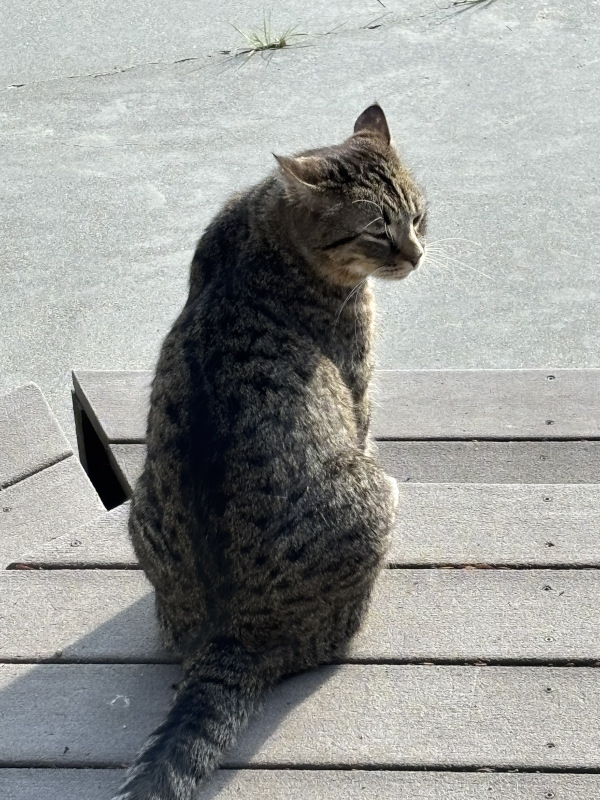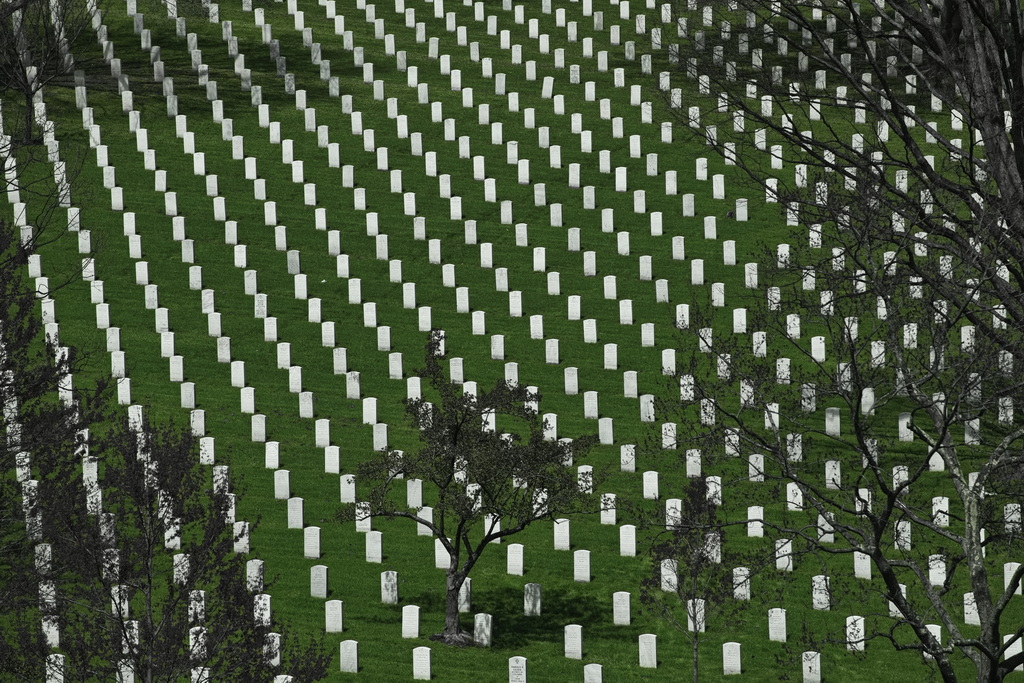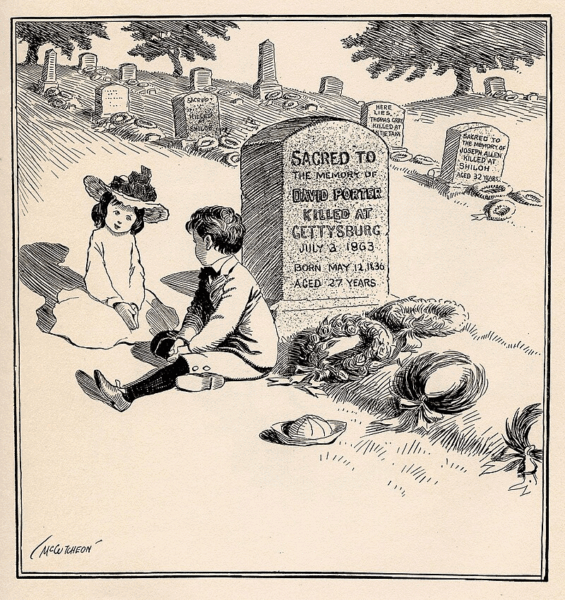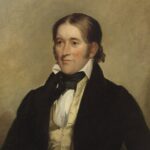… at Larry Lambert’s “Virtual Mirage” …

… at Larry Lambert’s “Virtual Mirage” …

from “Virtual Mirage” (www dot virtualmirage dot org/67343-2/) “Literary Interlude” May 28, 2025
“Ashes and Orbits” By A. Cooley
I am old now, my purpose is to remember our sins. I teach history from the twilight side of Aletheia Station, where the Earth always hangs dim beyond the glass, not quite night, not quite gone. The students come and go in rotating cohorts—agronomists from the Orchard Ribbons, welders from the Kestrel yards, the occasional monastic from the Numa Belt. Most of them don’t ask about Earth unless the exam requires it.
They’ve never seen rain that wasn’t calibrated, purified, clean.
They’ve never stood in soil that didn’t come from a recycler.
They call Earth “the cradle,” as if it was something tender, forgotten, buried in the arms of time.
But I remember it.
I remember what it cost to leave.
from Jean
I’d rather take the
quiet lane than highway speed.
To explore, detour.
+++++
Life’s travels vary.
They take you far and away
yet can bring you back.
Feed me, feed me, feed me … NOW!
Swoosh (can opening) Clink (food into bowl) Clunk (food bowl down on floor)

Hey, wait a minute! What’s this? Are you trying to poison me? Let me outside.

French fur traders – “Mountain Men” – trapping along the river were caught in a blizzard in the 1820s and buried their gunpowder along the banks (“Cache La Poudre” – “Hide the Powder”)
It flows from the upper reaches of Rocky Mountain National Park, down through LaPorte, Fort Collins, and flows into the South Platte near Greeley. The river flooded in 1864, destroying a military camp which then moved down river and created the fort of Fort Collins. Although now controlled somewhat, the banks – and homes built on them – are still subject to flooding. The Overland Stage line once followed along its northern bank as a major highway of the era.
This view is looking upriver from the LaPorte region.
… try, try again.
aka “Barbarossa II” or “Following the footsteps of Napoleon once again” or “We’ll get it right this time”

Barbarossa I started June 22; ended Dec 5

“Germany’s General Burkhalter Merz Greenlights Ukraine To Strike Russia With German Weapons“

Those funny Germans – even Sgt Schultz would know better.

Screw NATO.
This time, let’s just sit back and watch.

A sample of some obscure – and some maybe not obscure – tunes from my strange and off-the-wall collection.
Today’s selection: Deep Purple’s “Burn” cover 1974
Let me take you back to a Friday night in September 1974. A warm late summer evening. A pick-up college bar in a medium sized town in Michigan. Not really a dive bar … but the decor was open-ceiling industrial flat black. The toilets – at least the men’s version – were arranged for one purpose: getting rid of excessive amounts of cheap beer via various orifices. I’d find it hard to believe the women’s version was much different – perhaps those in the audience with experience of such places might express their thoughts … because – being a pick-up bar in a college town of the mid-70s – the girls fully participated in the fun.
Funny about all the dear, “I Love You, Man” friends I made there that were forgotten the next morning. Sometimes, I wish they had been forgotten the next morning. Sometimes, they wish I had been forgotten the next morning. Or the night before.
If I have child – unknown, unlikely, but possible – it would be about 50 years old now …
Anyway, any respectable (I use the term loosely but several of you will understand) bar of that era and that place had live music, at least on the weekends. Ted Nugent was one of the performers here. That type of dive bar. Somewhat local boy. I recall one “concert” where he basically practiced his screeching and feedback (though I like a fair amount of Nugent’s stuff, especially with Amboy Dukes – but this was after the Duke’s time and before he went solo)
On this Friday night, I had permission from the bar and band to record the show. I like this cover of Burn but the band shall remain nameless per their request. I actually like this version better than Deep Purple’s.
So – here you have a sample of Friday night bar music, 1974.

Today is considered Memorial Day because someone in 1968 decided that Federal employees should have a 3-day weekend (as well as all those other holidays now spent on Mondays). Memorial Day to me is still May 30 as originally intended.
But so be it – few even recall what Memorial Day represents other than “the beginning of (official) summer!”
Originally “Decoration Day” – a day to decorate the graves of Civil War soldiers, the holiday was recognized by all states by 1890. After the world wars, it became a day to remember all soldiers who died in war.

Congress changed the date from May 30 to the last Monday in May in 1968 (during the height of Vietnam and LBJ) and formalized the change of name to “Memorial Day” in 1971.
The VFW declared:
“Changing the date merely to create three-day weekends has undermined the very meaning of the day. No doubt, this has contributed a lot to the general public’s nonchalant observance of Memorial Day.“
My family has been tremendously lucky in times of war: direct ancestors on both sides of the American Revolution survived hale and hearty. None in the War of 1812 or Mexican War. All survived the Civil War (both sides). None in the Indian Wars or Spanish War. All survived WWI (with injuries), WWII, Korea (with injuries), and Vietnam. None in anything later … counting direct line and out to 1st cousins of each. One distant relative survived Little Big Horn, another survived the Spanish War … neither being close enough to consider “related” (Though I have one “relative” whose most recent common ancestor was born in Philadelphia in 1776 – a bit distant eh? Not even close enough to get married in Kentucky).
Only medal awarded I know of was Bronze Star with V.
As I’ve mentioned before, I missed that little kerfluffle in the jungle by the skin of my teeth and the grace of the release of the Pentagon Papers which caused a change in troop allotments. My draft orders were rescinded.
Many of those of my age and acquaintance weren’t so lucky but I only know of one that died over there. My cousins all made it back uninjured. I’m not aware that any friends were draft-dodgers but I know of at least one with a dishonorable discharge – never found out why.
It is my once-upon-a-time friend Jim who I remember on this day. Jim was a Marine. He was proud of his country and bucked the trend of the times:
“Hey, hey, LBJ. How many kids did you kill today?“
“And it’s one, two, three, what are we fighting for?
Don’t ask me, I don’t give a damn
Next stop is Vietnam“
I’m still not sure how I feel about those days. Peer pressure for sure. Kent State was a big thing at that time. That war was a useless example of political posturing, profiteering, and lies to the world and especially the American public. But I was never a “hippie” and didn’t care for what I came to understand as socialist ideas. I was old enough in ’64 to consider Barry Goldwater as my choice – I still have one of the books he put out: “Why Not Victory?“. I was kinda young for such things …
If you must fight a war, fight it to win. It seems we didn’t want to win in Vietnam.
But even being half Canadian, hopping the border wasn’t a consideration – I am American. Joining the Air Force might have happened. I wanted to fly B-52s … not bad enough to enlist on my own though.
Water long under the bridge but the after-effects are still with us.
Jim joined up as soon as he was old enough.
And then he came back.
At least his body returned.
My cousin was in the Marines as well. A few years older, he was in one of the Marine regiments at Khe San. He made it back – we get together every so often and play poker, drink beer, and not talk about the war.
Jim and I weren’t real close … but we weren’t really distant either. We went to school together, Boy Scouts together; would get together and do things small town high school kids did. After he got back from Vietnam, we’d get together down at the B-Bar and have a few beers, talk over older times … and in hindsight, it seems he was trying to re-connect with his life as it once was.
It didn’t take … so far as I ever knew.
We never really talked of his time in service; he said it was something we didn’t want to know and he didn’t want to talk of it. He never said if he regretted joining up. At least at that time, he wasn’t rah, rah Marines though. So many of today’s Vietnam vets talk as if they were happy and anxious to join up. Didn’t seem they felt that way at the time – so many were unwillingly drafted or given the choice of jail or service … at least those close to my age. Jim may have been the only one I knew fairly well that enlisted by choice.
My life took me away a few years later. Last I recall seeing Jim, he was sitting in a corner at the B-Bar – a small narrow place, room enough for the bar along one wall, an aisle to squeeze through, and narrow booths along the other wall. Pat, the bartender – a girl/now woman – of our age keeping an eye on him. Jim would break down crying at odd times and lose himself. Jim had never been that type; he was the type to prefer the Marines over the other services. I felt … not sorry, not pity – perhaps anger at those that caused this with so little care about the consequences of their numbers game.
I suspect our last words were something along the lines of “See you later“; I didn’t know then I wouldn’t be back and never see him again.
I lost touch with home and all the people there. I still have some family there but they are younger than me – too young for Vietnam – and didn’t know my peers. Mom’s buried there but I don’t go back anymore myself – town’s changed beyond recognition – from 7500 to 150,000 or more. The dirt roads I used to roam are 7 lanes wide now with traffic lights and road rage. The cornfields are full of multi-million dollar mansions packed together like sardines. The trains are long gone, so are the tracks – and the ghosts themselves have faded away. There’s no point stirring up resting spirits – even if I could get through the traffic.
And B-Bar’s long gone … even the trace of it has disappeared.
I hear stray rumors/facts every now and then. I’m at the age where friends and acquaintances passing on becomes more common. Joe’s gone; so is Dave. Sue disappeared, Becky killed herself, so did Linda. I heard Tom died a few years ago. I heard from one former serious HS girlfriend about 15 years ago; nothing since. Lost touch with Scott and another Joe. No reason to think they aren’t still around. A few – Eric, another Dave – turned into sufferers of TDS and cut off contact …
A day of remembrance …
I never did hear anymore about Jim … or Pat either for that matter. I suspect Jim has passed on. Maybe – wherever – he’s found peace within himself again.
The band Kansas said it better than I can: “Dust In The Wind“.
I play that tune on Memorial Day.
Here’s to a remembrance, Jim … wherever you may be.
Submitted by ghostsniper via Comments
From The Life of Colonel David Crockett, compiled by Edward S. Ellis
(Philadelphia: Porter & Coates, 1884)
David Crockett
Member of Congress 1827-31, 1832-35
One day in the House of Representatives, a bill was taken up appropriating money for the benefit of a widow of a distinguished naval officer. Several beautiful speeches had been made in it’s support. The Speaker was just about to put the question when Crockett arose:
“Mr. Speaker– I have as much respect for the memory of the deceased, and as much sympathy for the suffering of the living, if suffering there be, as any man in this House, but we must not permit our respect for the dead or our sympathy for a part of the living to lead us into an act of injustice to the balance of the living. I will not go into an argument to prove that Congress has no power to appropriate this money as an act of charity. Every member upon this floor knows it. We have the right, as individuals, to give away as much of our own money as we please in charity; but as members of Congress we have no right so to appropriate a dollar of the public money. Some eloquent appeals have been made to us upon the ground that it is debt due the deceased.
Mr. Speaker, the deceased lived long after the close of the war; he was in office to the day of his death, and I have never heard that the government was in arrears to him. Every man in this House knows it is not a debt. We cannot, without the grossest corruption, appropriate this money as the payment of a debt. We have not the semblence of authority to appropriate it as a charity. Mr. Speaker, I have said we have the right to give as much money of our own as we please. I am the poorest man on this floor. I cannot vote for this bill, but I will give one week’s pay to the object, and if every memeber of Congress will do the same, it will amount to more than the bill asks.”
He took his seat. Nobody replied. The bill was put upon its passage, and, instead of passing unanimously, as was generally supposed, and as, no doubt it would, but for that speech, it received but few votes, and, of course, was lost.
Later, when asked by a friend why he had opposed the appropriation, Crockett gave this explanation:
“Several years ago I was one evening standing on the steps of the Capitol with some other members of Congress, when our attention was attracted by a great light over in Georgetown. It was evidently a large fire. We jumped into a hack and drove over as fast as we could. In spite of all that could be done, many houses were burned and many families made homeless, and besides, some of them had lost all but the clothes they had on. The weather was very cold, and when I saw so many women and children suffering, I felt that something ought to be done for them. The next morning a bill was introduced appropriating $20,000 for their relief. We put aside all other business and rushed it through as soon as it could be done.
“The next summer, when it began to be time to think about the election, I concluded I would take a scout around among the boys of my district. I had no opposition there, but, as the election was some time off, I did not know what might turn up. When riding one day in a part of my district in which I was more of stranger than any other, I saw a man in a field plowing and coming toward the road. I gauged my gait so that we should meet as he came to the fence. As he came up, I spoke to the man. He replied politely, but, as I thought, rather coldly.
“I began: “Well, friend, I am one of those unfortunate beings called candidates, and—-‘
“Yes, I know you you are Colonel Crockett. I have seen you once before, and voted for you the last time you were elected. I suppose you are out electioneering now, but you had better not waste your time or mine. I shall not vote for you again.’
“This was a sockdolager….I begged him to tell me what was the matter.
“Well, Colonel, it is hardly worth-while to waste time or words upon it. I do not see how it can be mended, but you gave a vote last winter which shows that either you have not capacity to understand the Constitution, or that you are wanting in honesty and firmness to be guided by it. In either case you are not the man to represent me. But I beg your pardon for expressing it in that way. I did not intend to avail myself of the privilege of the constituent to speak plainly to a candidate for the purpose of insulting or wounding you. I intended by it only to say that your understanding of the Constitution is very different from mine; and I will say to you what, but for rudeness, I should not have said, that I believe you to be honest…. But an understanding of the Constitution different from mine I cannot overlook, because the Constitution, to be worth anything, must be held sacred, and rigidly observed in all its provisions. The man who wields power and misinterprets it is the more dangerous the more honest he is.’
“‘I admit the truth of all you say, but there must be some mistake about it, For I do not remember that I gave any vote last winter upon any constitutional question.’
“‘No, Colonel, there’s no mistake. Though I live here in the back woods and seldom go from home, I take the papers from Washington and read very carefully all the proceedings in Congress. My papers say last winter you voted for a bill to appropriate $20,000 to some suffers by fire in Georgetown. Is that true?’
“‘Well, my friend, I may as well own up. You have got me there. But certainly nobody will complain that a great and rich country like ours should give the insignificant sum of $20,000 to relieve it’s suffering women and children, particularly with a full and overflowing Treasury, and I am sure, if you had been there, you would have done just as I did.’
“‘It is not the amount, Colonel, that I complain of; it is the principle. In the first place, the government ought to have in the Treasury no more than enough for its legitimate purposes. But that has nothing to do with the question. The power of collecting and disbursing money at pleasure is the most dangerous power that can be intrusted to man, particularly under our system of collecting revenue by tariff, which reaches every man in the country, no matter how poor he may be, and the poorer he is the more he pays in proportion to his means. What is worse, it presses upon him without his knowledge where the weight centers, for there is not a man in the United States who can ever guess how much he pays to the government. So you see, that while you are contributing to relieve one, you are drawing it from thousands who are even worse off than he. If you had the right to give anything, the amount was simply a matter of discretion with you, and you had as much right to give $20,000,000 as $20,000. If you have the right to give to one, you have the right to give to all; and, as the Constitution neither defines charity nor stipulates the amount, you are at liberty to give to anything and everything which you may believe, or profess to believe, is a charity, and to any amount you may think proper. You will very easily perceive what a wide door this would open for fraud and corruption and favortism, on the one hand, and for robbing the people on the other. No, Colonel, Congress has no right to give charity. Individual members may give as much of their own money as they please, but they have no right to touch a dollar of the public money for that purpose.If twice as many houses had been burned in this county as in Georgetown, neither you nor any other member of Congress would have thought of appropriating a dollar for our relief.
There are about two hundred and forty members of Congress. If they had shown their sympathy for the suffers by contributing each one week’s pay, it would have made over $13,000. There are plenty of men in and around Washington who could have given $20,000 without depriving themselves of even a luxury of life.. The congressmen chose to keep their own money, which, if reports be true, some of them spend not very creditable; and the people about Washington, no doubt, applauded you for relieving them from the necessity of giving by giving what was not yours to give. The people have delegated to Congress, by the Constitution, the power to do certain things. To do these, it is authorized to collect and pay moneys, and for nothing else. Everything beyond this is usurpation, and a violation of the Constitution.
“‘So you see, Colonel, you have violated the Constitution in what I consider a vital point. It is a precedent fraught with danger to the country, for when Congress once begins to stretch it’s power beyond the limits of the Constitution, there is no limit to it, and no security for the people. I have no doubt you acted honestly, but that does not make it any better, except as far as you are personally concerned, and you see that I cannot vote for you…’
“I tell you I felt streaked. I saw if I should have oppostion, and this man should go talking, he would set others to talking, and in that district I was a gone fawn-skin. I could not answer him, for the fact is, I was so fully convinced that he was right, I did not want to. But I must satisfy him, and I said to him:
“Well, my friend, you hit the nail upon the head, when you said I had not sense enough to understand the Constitution. I intended to be guided by it, and thought I had studied it fully, I have heard many speeches in congress about the powers of the Congress, but what you have said here at your plow has got more hard, sound sense in it than all the fine speeches I ever heard. If I had ever taken the view of it that you have, I would have put my head into the fire before I would have given that vote; and if you will forgive me and vote for me again, if I ever vote for another unconstitutional law I wish I may be shot.’
“He laughingly replied: “Yes Colonel, you have sworn to that once before, but I will trust you again upon one condition. You say that you are convinced that your vote was wrong. Your acknowledgment of it will do more good than beating you for it. If, as you go around the distict, you will tell people about this vote, and that you are satisfied it was wrong, I will not only vote for you, but will do what I can to keep down opposition, and perhaps, I may exert some little influence in that way.’
“‘If I don’t,’ said I. “I wish I may be shot; and to convince you that I am in earnest in what I say I will come back this way in a week or ten days, and if you will get up a gathering of the people, I will make a speech to them. Get up a barbeque, and I will pay for it.’
“‘No Colonel, we are not rich people in this section, but we have plenty of provisions to contribute for a barbeque, and some to spare for those who have none.. The push of crops will be over in a few days, and we can then afford a day for a barbeque. This is Thursday; I will see to getting up on Saturday week. Come to my house on Friday, and we will go together, and I promise you a very respectable crowd to see and hear you.’
“‘Well, I will be here. But one thing more before I say good-by. I must know your name.’
“‘My name is Bunce.’
“‘Not Horatio Bunce?’
“‘Yes.’
“‘Well, Mr. Bunce, I never saw you before though you say you have seen me, but I know you very well. I am glad I have met you, and very proud that I may hope to have you for my friend.’
“It was one of the luckiest hits of my life that I met him. He mingled but little with the public, but was widely known for a heart brimful and running over with kindness and benevolence, which showed themselves not only in words but in acts. He was the oracle of the whole country around him, and his fame had extended far beyond the circle of his immediate acquaintance. Though I had never met him before, I had heard much of him, and but for this meeting it is very likely I should have had opposition, and had been beaten. One thing is very certain, no man could now stand up in that district under such a vote.
“At the appointed time I was at his house, having told our conversation to every crowd I had met, and to every man I stayed all night with, and I found that it gave the people an interest and a confidence in me stronger than I had ever seen manifested before.
“Though I was considerably fatigued when I reached his house, and, under ordinary circumstances, should have gone early to bed, I kept up until midnight, talking about the principles and affairs of government and got more real, true knowledge of them than I had got all my life before.
“I have known and seen much of him since, for I respect him — no, that is not the word — I reverence and love him more than any living man, and I go to see him two or three times a year; and I will tell you sir, if everyone who professes to be a Christian, lived and acted and enjoyed it as he does, the religion of Christ would take the world by storm.
“But to return to my story. The next morning we went to the barbecue, and, to my surprise, found about a thousand men there. I met a good many whom I had not known before, and they and my friend introduced me around until I had got pretty well acquainted—at least, they all knew me.
“In due time notice was given that I would speak to them. They gathered up around a stand that had been erected. I opened my speech by saying: “Fellow-citizens — I present myself before you today feeling like a new man. My eyes have lately been opened to truths which ignorance or prejudice, or both, had heretofore hidden from my view. I feel that I can today offer you the ability to render you more valuable service than I have ever been able to render before. I am here today more for the purpose of acknowledging my error than to seek your votes. That I should make this acknowledgement is due to myself as well as to you. Whether you will vote for me is a matter for your consideration only.’
“I went on to tell them about the fire and my vote for the appropriation and then told them why I was satisfied it was wrong. I closed by saying:
“And now, fellow-citizens, it remains only for me to tell you that the most of the speech you have listened to with so much interest was simply a repetition of the arguments by which your neighbor, Mr. Bunce, convinced me of my error.
“‘It is the best speech I ever made in my life, but he is entitled to the credit for it. And now I hope he is satisfied with his convert and that he will get up here and tell you so.’
“He came upon the stand and said:
“‘Fellow-citizens — It affords me great pleasure to comply with the request of Colonel Crockett. I have always considered him a thoroughly honest man, and I am satisfied that he will faithfully perform all that he has promised you today.’
“He went down, and there went up from that crowd such a shout for Davy Crockett as his name never called forth before.
“I am not much given to tears, but I was taken with a choking then and felt some big drops rolling down my cheeks. And I tell you now that the remembrance of those few words spoken by such a man, and the honest, hearty shout they produced, is worth more to me than all the reputation I have ever made, or shall ever make, as a member of Congress.
“Now, sir,” concluded Crockett, “you know why I made that speech yesterday.
“There is one thing now to which I will call your attention. You remember that I proposed to give a week’s pay. There are in that House many very wealthy men– men who think nothing of spending a week’s pay, or a dozen of them, for a dinner or a wine party when they have something to accomplish by it. Some of those same men made beautiful speeches upon the great debt of gratitude which the country owed the deceased — a debt which could not be paid by money — and the insignificant and worthlessness of money, particularly so insignificant a sum as $10,000, when weighed against the honor of the nation. Yet not one of them responded to my proposition. Money with them is nothing but trash when it is to come out of the people. But it is the one great thing for which most of them are striving, and many of them sacrifice honor, integrity, and justice to obtain it.”

“New York Governor Kathy Hochul Complains Republican Spending Bill Could Cut Services to ‘Members of the Undocumented Community’“
The only services ‘Members of the Undocumented Community’ should receive is a pre-paid, one-way ticket out. Hochul can accompany them.
(However, the concept of “documented” can be discussed under separate cover. But we all know what is meant.)